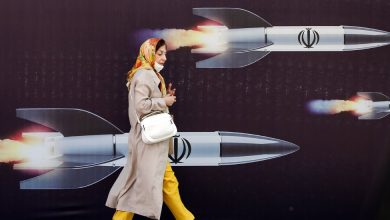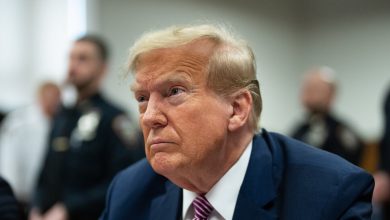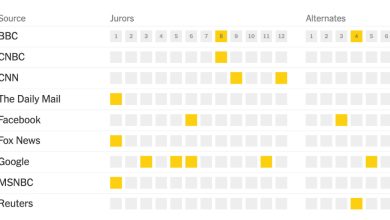NATO Vows United Response to Russian Aggression Against Ukraine

BRUSSELS — NATO foreign ministers met virtually on Friday to prepare their responses to Russia’s ongoing military buildup near Ukraine amid general skepticism about Moscow’s willingness to de-escalate and negotiate in earnest.
After the meeting, the NATO secretary-general, Jens Stoltenberg, warned that “the risk of conflict is real” involving a further Russian invasion of Ukraine. But he asserted that the 30-member alliance was united in its desire for peaceful diplomacy.
If diplomacy fails, he said, the alliance is prepared to continue supporting the integrity and independence of Ukraine both “politically and practically” while creating “significant consequences” that “carry a heavy price for Russia.”
And he insisted, as President Biden has done, that the United States would not make any deals with Russia and its president, Vladimir V. Putin, over the heads of Ukraine or its European allies.
Friday’s online meeting of foreign ministers was the kickoff to what may be a momentous week for European security. The meeting followed significant efforts at forming a cohesive Western response to Russia’s buildup near Ukraine and its sweeping and unrealistic demands for a Russian zone of influence free of NATO and Western involvement.
The meeting was a chance to confirm allied agreement about how to respond to varying Russian actions, and, importantly, an opportunity for Secretary of State Antony J. Blinken to consult with allies and brief them about the U.S. position before U.S.-Russia bilateral talks next week in Geneva.
Those Geneva talks, at deputy foreign minister level, will occur on Monday as NATO meets in Brussels with Ukraine’s foreign minister, Dmytro Kuleba.
Then on Wednesday, there is a meeting in Brussels of the long-moribund NATO-Russia Council, and on Thursday, in Vienna, there will be talks at the Organization for Security and Cooperation in Europe, a group of 57 nations, including Ukraine and Russia. At the same time, NATO’s military chiefs will be meeting virtually “to discuss issues of strategic importance to the alliance,’’ NATO said in a statement.
This flurry of talks is an effort to provide a diplomatic de-escalation of the Russian-created crisis in Ukraine, combined with efforts to coordinate serious sanctions against Russia if Mr. Putin decides on further military incursions into Ukraine, and examine the military consequences for NATO itself.
The United States has worked hard and effectively, diplomats say, to pull NATO and the European Union into a joint front against possible Russian moves against Ukraine. For NATO, which does not apply economic sanctions, likely responses will be to beef up deterrence in allied countries bordering Russa and furthering support for Ukraine to defend itself — precisely the outcome Mr. Putin says he does not want.
But no one pretends to know what is in Mr. Putin’s mind, or whether the new unrest in Kazakhstan will preoccupy him and make a move in Ukraine less likely.
NATO officials say they want to keep the focus on Russian activities in and near Ukraine, and not get sidetracked into a larger debate on Europe’s security structure. They see this week of talks as dialogue, not negotiation — to see if substantive negotiations on issues of concern to both sides make sense, but only if Russia de-escalates around Ukraine.
Understand the Escalating Tensions Over Ukraine
A brewing conflict. Antagonism between Ukraine and Russia has been simmering since 2014, when the Russian military crossed into Ukrainian territory, annexing Crimea and whipping up a rebellion in the east. A tenuous cease-fire was reached in 2015, but peace has been elusive.
A spike in hostilities. Russia has recently been building up forces near its border with Ukraine, and the Kremlin’s rhetoric toward its neighbor has hardened. Concern grew in late October, when Ukraine used an armed drone to attack a howitzer operated by Russian-backed separatists.
Ominous warnings. Russia called the strike a destabilizing act that violated the cease-fire agreement, raising fears of a new intervention in Ukraine that could draw the United States and Europe into a new phase of the conflict.
The Kremlin’s position. President Vladimir V. Putin of Russia, who has increasingly portrayed NATO’s eastward expansion as an existential threat to his country, said that Moscow’s military buildup was a response to Ukraine’s deepening partnership with the alliance.
A measured approach. President Biden has said he is seeking a stable relationship with Russia. So far, his administration is focusing on maintaining a dialogue with Moscow, while seeking to develop deterrence measures in concert with European countries.
NATO officials say that many member states are not overly optimistic about a diplomatic de-escalation and believe that Russia may simply want to buy time and be able to say to its citizens that the West was unwilling to talk and thus find a pretext to walk away.
NATO’s 30 members include only two, the United States and Canada, that are not European, Mr. Stoltenberg emphasized. So dialogue with Russia will not be a question of the United States alone, he said. He said he is also briefing close partners, like Finland and Sweden, which have had new debates about joining NATO in light of Mr. Putin’s latest threats to use military force.
As soon as the Wednesday meeting with Russia is concluded, Mr. Stoltenberg said, he will brief European Union leaders and their defense ministers about the talks, as the Americans also intend to do.
The NATO-Russia Council was established in 2002 as a place to discuss mutual security concerns. But it has been essentially moribund since April 2014 and the Russian invasion of Ukraine and annexation of Crimea. But neither side has abandoned it completely, with the last meeting in the summer of 2019, as NATO argues that it remains open to dialogue even as it enhances deterrence.
Still, as relations worsened with Russia, NATO expelled eight members of the Russian mission to the alliance for spying last October and reduced the number of accredited Russian diplomats.
Russia responded by suspending the work of the mission to NATO and required the alliance to suspend its military liaison mission in Moscow and close its information office there.



